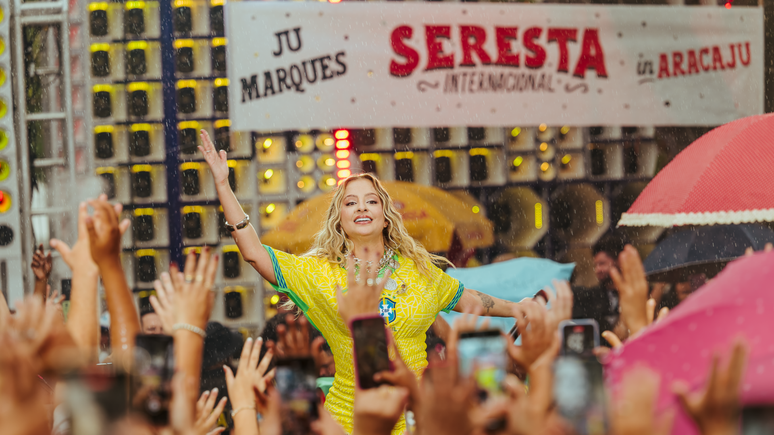As the Venice Film Festival celebrates Iranian cinema (four Iranian films are shown at the 79th Biennale), in Tehran, Iranian filmmakers and artists face the most brutal repression in decades.
The hardline government of Iranian President Ebrahim Raisi has increased pressure on dissident artists and all critics of the regime. In July, authorities arrested three famous directors: Mostafa Al-Ehmadi (2009 Correspondence), the owner of the 2020 Berlin Golden Bear, Mohamed Rasulof (There is no such thing as evil) and Jafar Panahi, winner of the Golden Lion of Venice Deyereh (2000) and for the Golden Bear of Berlin Taxi (2015).
Al-Ehmadi and Rasoulof were among 170 prominent Iranian filmmakers, artists and actors who signed an open letter on May 29 urging the country’s security forces to “lay down their arms” and stand with the people against the government. . plagued by “corruption, theft, inefficiency and repression”. The letter was in response to the brutal crackdown on protests that followed the collapse of a 10-story building in the city of Abadan, which killed dozens of people.
On August 16, the Iran Film Organization, a government body affiliated with Iran’s Ministry of Culture, took the unusual step of announcing that it would soon publish a “black list” of filmmakers who would be banned from working unless they resign. . .
“The blacklist is a ploy for directors who signed the open letter to publicly distance themselves from it and claim they didn’t know what they signed,” a top Iranian producer told the paper. the hollywood reporterHe spoke on condition of anonymity.
Panahi, one of Iran’s most famous and well-known directors, was arrested when he went to the prosecutor’s office to report Rasoulof’s arrest. In 2011, Panahi and Rasuloff were suspended for 20 years and sentenced to years in prison for propaganda against the regime, although both continued to work in secret and, to date, neither has been arrested.
According to Human Rights Watch, the latest arrests are part of a broader crackdown on dissent, fueled by Tehran’s desire to divert attention from the “deteriorating economic situation” in the country, which is in the midst of a severe recession and apparently stagnant . The government’s attempt to restore the nuclear deal with the international community. Iranian authorities have also stepped up their crackdown on women, introducing new restrictions on women’s clothing and tightening the country’s mandatory hijab rules.
“Everything goes together, the regime has always been an enemy of cinema, art and women, because they are all signs of modernity,” says Shiva Rahbaran, an Iranian writer based in London and author of Iranian Cinema Uncensored. Government censorship and repression, he says, is an “Earth Day phenomenon” in Iran, where the Tehran regime “opens up a little bit, creates a little breach, breathes in space, and then destroys it again, just like the so often criticized movies and their creators become very popular among people.”
But the current repression, according to him, is a step forward. Rahbaran points to statements by Iran’s Supreme Leader Ali Khamenei that he wanted the country to go back to the 1980s, right after the Islamic Revolution, “when the Islamic ideology was strong and the revolution was very big and broad”. Rahbaran says the problem is that Iranian society has moved on. Instead of supporting religious followers, the majority in the country support dissident filmmakers.
“Filmmakers are very popular with people, and the more the government represses them, the more popular they become,” he says. “Like a movie director [two-time Oscar winner] Asghar Farhad, who has never used his platform to criticize the brutal regime, is very unpopular in Iran, he does not have the same position among the people.”
In addition to selecting four Iranian films this year – Panahi’s most recent, no bearsand Vahid Jalilvand behind the wall The debut will take place at Lido, in the Houman Seyedi competition. Third World War and they are from Vazirdaftari without him, without her Sidebar Venice Horizons: Venice is showing what it calls “more solidarity” with Iranian filmmakers with a series of public events, including a “flash mob” on the red carpet on September 9, the day before. no bears premiere. Filmmakers, actors and other prominent personalities will be invited to register the names of the arrested artists, including Rasuloff and Panahi. A panel in Venice on September 3 will examine the plight of exiled filmmakers around the world and discuss what the rest of the film world can do to help.
Protests like the film festival are nothing new. The Cannes Film Festival in Tehran in 2010 symbolically left an empty seat at the opening ceremony for Panah, who was invited to serve on the competition’s jury despite being under house arrest and unable to leave Iran. Berlin made a similar gesture to Panahi’s “empty chair” in 2011. Like Cannes, Berlin named Panahi a member of the jury. Several major festivals, including Cannes, Venice and Berlin, have publicly called for the release of all dissident filmmakers imprisoned in Iran.
It is hoped that the public pressure generated by such statements and protests will lead to changing and improving the situation of filmmakers on the ground. But some warn that it can have the opposite effect.
“The new government is a tough side, and the most important thing for them is to show their anti-Western and anti-American credentials,” says an Iranian producer with decades of experience negotiating government censorship. “When international festivals put on a show, put an empty chair for Panah in Berlin or whatever, it forces the regime to hit the filmmakers harder.”
Ali Abbas success sacred spider At Cannes this year, the Iranian serial killer drama won the best actress award for Zar Amir-Ebrahim, there was an immediate reaction. Iran’s Culture Minister Mehdi Esmaili warned that those who worked sacred spider will be punished, raising fears about the fate of the film’s editor, Haydeh Safiar. (Abbas and most of the film’s cast and crew, including Amir-Ebrahim, live outside of Iran.)
“I prefer to see festivals that show and celebrate Iranian films without attacking the regime,” says the producer. “Too much attention will make it harder to get these wardens out of prison because
The government wants to show that it does not listen to the voice of the West and the demands of the West.”
However, many believe the recent crackdown on Iran is the latest blow to the dying regime.
“It’s really a sign of fear and weakness, lack of popularity, a government with very little public support,” says Rahbaran. “This will make things more difficult for artists and residents. But how many filmmakers, how many women can be arrested? How many people can they kill?
Source: Hollywood Reporter
Benjamin Smith is a fashion journalist and author at Gossipify, known for his coverage of the latest fashion trends and industry insights. He writes about clothing, shoes, accessories, and runway shows, providing in-depth analysis and unique perspectives. He’s respected for his ability to spot emerging designers and trends, and for providing practical fashion advice to readers.





![More beautiful life in advance: Vadim takes risks … which awaits you a week from June 21 to July 25, 2025 [SPOILERS] More beautiful life in advance: Vadim takes risks … which awaits you a week from June 21 to July 25, 2025 [SPOILERS]](https://fr.web.img5.acsta.net/img/35/fa/35fa75709055af9b02e6282f4faa6ca7.jpg)

![We belong to us in advance tomorrow [SPOILERS]L We belong to us in advance tomorrow [SPOILERS]L](https://fr.web.img5.acsta.net/img/6e/b2/6eb29fd496417b85c5b52428b6abf9e1.jpg)

